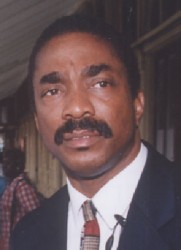Building a local law school is not a priority for the current government in the light of “the type of economy” it inherited, according to Attorney-General Basil Williams.
“We couldn’t even find money to assist the law students,” Williams said at a press conference.
He could not immediately say how much such a school could cost but added that a committee will be established to look into it. He said too a public/private venture could be an option as it will give Guyanese students the op-portunity to stay here and study.

Williams also made it clear that the APNU+AFC elections manifesto said nothing about the establishing of a law school and comments made by the former Attorney-General Anil Nandlall in this regard are erroneous.
He did, however, point out that the former administration also refused to establish a law school here though permission had been granted.
He said he learned at a Council of Legal Education (CLE) meeting that Guyana had received permission to open a law school but the then government subsequently “reneged” on the idea and one of the reasons given was that it would have to pay equivalent salaries to what is given to lecturers in other Caribbean countries.
Williams also emphasised that the current administration is not responsible for the difficulties facing local law students seeking entry into the Hugh Wooding Law School (HWLS) in Trinidad.
The top 25 students from the University of Guyana’s Depart-ment of Law are granted automatic entry to the HWLS each year although in recent years there has been uncertainty over their acceptance.
Since Guyana no longer contributes to the CLE, which governs the HWLS, local students have been faced with a tuition hike of over 30%. This prompted a call for government intervention.
“The present state and plight of law students in Guyana rests solely and squarely on the PPP/C… We have been in office for four months, I am not sure how we are being blamed for things that had occurred in 23 years and were not remedied in the 23 years,” Williams said.
He rubbished suggestions being made by the opposition that the issue could be remedied overnight and in the short time that the David Granger administration has been in power, “when they had 23 years to do it and it didn’t do it.”
According to Williams, given the then government’s withdrawal of its financial assistance to the HWLS, everyone going there knew that they had to pay the full tuition fee. He also spoke of the former government breaching its “own rule” and sending “children of party hacks” to the law school.
The University of Guyana Law Society has stated that President Granger, during an engagement with UG students during the recent elections campaign, indicated that his government will work toward ensuring that such a school becomes a reality before his tenure is through. As a result of the recent tuition hike, it had urged that steps be taken in this direction as soon as is practicable.





